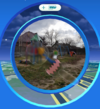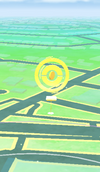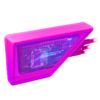PokéStop: Difference between revisions
m (Text replacement - "{{-}}↵{{Project Sidegames notice}}" to "{{Project Sidegames notice}}") |
m (→In the TCG) |
||
| Line 264: | Line 264: | ||
[[File:PokéStopPokémonGO68.jpg|200px|thumb|PokéStop in the TCG]] | [[File:PokéStopPokémonGO68.jpg|200px|thumb|PokéStop in the TCG]] | ||
{{main|PokéStop (Pokémon GO 68)}} | {{main|PokéStop (Pokémon GO 68)}} | ||
'''PokéStop''' was introduced as a {{TCG|Stadium card}} in the [[Pokémon Trading Card Game]] during the English Sword & Shield Series (the Japanese Sword & Shield Era). It was first released in the Japanese and English {{TCG|Pokémon GO}} expansions, with artwork by [[Studio Bora Inc.]] It allows each player to discard three cards from the top of their deck. If they discard any Item | '''PokéStop''' was introduced as a {{TCG|Stadium card}} in the [[Pokémon Trading Card Game]] during the English Sword & Shield Series (the Japanese Sword & Shield Era). It was first released in the Japanese and English {{TCG|Pokémon GO}} expansions, with artwork by [[Studio Bora Inc.]] It allows each player to discard three cards from the top of their deck. If they discard any {{TCG|Item card}}s in this way, they put them back into their hand. | ||
{{-}} | {{-}} | ||
Latest revision as of 15:59, 19 September 2024
- Not to be confused with Poké Spot.
A PokéStop (Japanese: ポケストップ PokéStop) is a feature found at fixed real-world locations in Pokémon GO where the player can obtain items. Since June 20, 2017, players can also obtain items at Gyms like at PokéStops.
Overview

In the Map View, PokéStops are marked as blue floating cubes by default. When the player is within range of a PokéStop, the cube will turn into a Poké Ball symbol. If the player has used a PokéStop recently, it will be purple instead of blue. When it nears the time when it can be used again, it will begin to change shades back to blue. If the player is a certain distance away from a PokéStop, it will only appear as a floating blue cube, regardless of whether it has never been visited or recently been visited.
PokéStops that the player have never visited are surrounded by a white ring. This functionality was added on June 21, 2017, and does not account for whether a PokéStop was visited prior to the update.
The Nearby Pokémon listing will show Pokémon that are by nearby PokéStops.
If a PokéStop is moving and frequently turning black, a Team GO Rocket Grunt is there stealing items.
During Halloween events, starting in 2022, PokéStops are orange instead of blue with jack-o'-lanterns around their bases.
After Dratini's Community Day Classic, several PokéStops turned gold and awarded either extra items or a ?????? Coin to coincide with the tease of Gimmighoul ahead of its release in Pokémon Scarlet and Violet. A day later, the appearance rate of gold PokéStops was greatly decreased, functioning as a rarer variant of a PokéStop. A regular PokéStop can be made golden by using the Golden Lure Module, which was introduced to Pokémon GO on February 27, 2023.
After Chespin's Community Day, Kecleon started rarely appearing on PokéStops. Kecleon hangs onto the PokéStop for one hour*. PokéStops can't be spun when it is occupied by Kecleon. The player has to tap the Pokémon multiple times to make it jump off, making it spawn next to the PokéStop. Its IVs and CP vary for different players.
Using PokéStops
PokéStops can be visible in Pokémon GO from long distances, well outside the range the player must be in to be able to use it. If the player taps on a visible PokéStop, they will be able to see its Photo Disc (with a partial photo of the real world location). Above the Photo Disc is a module slot and the PokéStop's name. Tapping the PokéStop's name will show a larger photo of the real-world location and the full description of the location (if any).
If the player comes into sufficient proximity to the PokéStop (marked by the ring that expands from the player's position in-game), they will be able to be able to spin the Photo Disc. This will grant the player 3 to 5 items, occasionally including a Pokémon Egg, and 50 XP (250 XP the first time the player uses a PokéStop, as tracked from June 21, 2017). The player can also earn bonus items and XP.
The items earned by spinning a Photo Disc appear in bubbles that the player can tap, but doing so is not required to collect them. Once a Photo Disc has been spun, it cannot be spun again for five minutes.
Obtainable items
The items that searching a PokéStop can yield are dependent on the player's level, with certain items not being unlocked until later levels. Multiple of the same item can be obtained from a single search.
| Item | Min. level | |
|---|---|---|
| Poké Ball | 1 | |
| Sticker | 1 | |
| Nanab Berry | 4* | |
| Potion | 5 | |
| Revive | 5 | |
| Razz Berry | 8 | |
| Super Potion | 10 | |
| Dragon Scale | 10* | |
| King's Rock | 10* | |
| Metal Coat | 10* | |
| Sun Stone | 10* | |
| Upgrade | 10* | |
| Great Ball | 12 | |
| Hyper Potion | 15 | |
| Pinap Berry | 18* | |
| Ultra Ball | 20 | |
| Max Potion | 25 | |
| Max Revive | 30 |
*: first made available February 16, 2017. Nanab Berry's minimum level was originally 14, but this was changed to level 4 on June 22, 2017.
Bonuses
If the player searches 10 different PokéStops in a row, upon spinning the tenth PokéStop they will receive a large number of items and an Egg. If the player visits any PokéStop twice within a chain, the chain is broken.
The first time the player spins a Photo Disc at a PokéStop or a Gym each day (based on local time), they also earn a bonus 500 XP and extra items. If the player has spun a Photo Disc every day for 7 days in a row, they will instead receive 2,500 XP and more items for the seventh day's bonus (after which the player's streak resets). The seventh day bonus will also include one Evolution item (Dragon Scale, King's Rock, Metal Coat, Sun Stone, or Upgrade).
The daily bonuses were added to Pokémon GO in version 0.45.0 (labelled 1.15.0 in the iOS App Store), released on November 7, 2016. The guaranteed Evolution item in the seventh day bonus was added on March 21, 2017.
PokéStop modules
While within range of a PokéStop, the player can place a PokéStop module in its module slot, adding a temporary effect to the PokéStop for all players. A PokéStop can only have one PokéStop module at a time, meaning that a new PokéStop module cannot be placed until the old one runs out. PokéStop modules cannot be removed after being placed. Any player viewing a PokéStop can see the username of the player who added the PokéStop module. Currently, there are only four types of PokéStop modules: the Lure Module, the Magnetic Lure Module, the Mossy Lure Module, and the Glacial Lure Module.
A Lure Module placed in a PokéStop's module slot will remain active for 30 minutes. While active, it increases the frequency that wild Pokémon appear near the PokéStop. A PokéStop with an active Lure Module will have pink petals falling around it in the Map View.
Niantic has expressed interest in releasing other kinds of PokéStop modules.[1]
On May 17, 2019, Niantic released three different upgrades to the standard Lure Module: the Magnetic, Mossy, and Glacial Lure Modules.[2] On May 4, 2021, in conjunction with the Luminous Legends X event, Niantic released a fourth upgrade to the Lure Module: the Rainy Lure Module.[3]
If the player is near a PokéStop with an active Mossy or Glacial Lure Module, they may evolve Eevee into Leafeon or Glaceon, respectively, each for ![]() 25. Furthermore, with an active Glacial Lure Module, the player can also evolve a Crabrawler into Crabominable for
25. Furthermore, with an active Glacial Lure Module, the player can also evolve a Crabrawler into Crabominable for ![]() 50.
50.
If standing within range of a PokéStop with a Magnetic Lure Module active, the player may evolve a Magneton into Magnezone for ![]() 100, a Nosepass into Probopass for
100, a Nosepass into Probopass for ![]() 50, or a Charjabug into Vikavolt for
50, or a Charjabug into Vikavolt for ![]() 100.
100.
If standing near a PokéStop with a Rainy Lure Module active, the player may evolve a Sliggoo into a Goodra for ![]() 100.
100.
PokéStop Showcases
Players can compete with each other by placing a Pokémon at certain PokéStops. Player Pokémon can be ranked on size, and all participant trainers receive rewards at the end, with the top three ranked players earning items such as an Egg Incubator and a Star Piece. Eligible Pokémon vary but usually are ones found in whichever season is the current one.[4]
PokéStop placement
PokéStops are generally found in public locations, including (but not limited to) public artwork or murals, places of worship, libraries, famous landmarks, police stations, fire stations, and public parks.
PokéStops are based on a selection of portals from the Niantic game Ingress. Until 2015, Ingress players could submit proposals for portals which subsequently had to be approved by Niantic. Since 2017, portal submissions have returned for Level 10 players, with a new feature called Operation Portal Recon opened up for Level 12 players. In Ingress Prime, portal submissions are only available in Brazil, South Korea, Australia, and New Zealand, and are expected to roll out for other nations later on.
On October 9, 2019, the Operation Portal Recon services ended and were replaced with a new feature called Niantic Wayfarer. It became available for Ingress players imminently, and is expected for Harry Potter: Wizards Unite sometime in 2020. It was released worldwide for Pokémon GO players on November 13, 2019, after several countries were given early access during the testing stage.
If for some reason a physical location is unsuitable as a PokéStop, players may send a request to Niantic via the Pokémon GO website or Niantic Support official Twitter account to remove it from the game. This could be due to safety concerns or if there is an error related to the PokéStop (the landmark no longer exists, never existed in the first place, or has been converted to a different use such as a private residence).
Since September 2018, Level 40 players have been able to submit stops in a limited number of countries. Nominations were released worldwide on November 13, 2019. Since November 2020, players are able to submit stops starting at Level 38.
| Region | Start date |
|---|---|
| Brazil | September 19, 2018[5] |
| South Korea | |
| Mexico | October 18, 2018[6] |
| Thailand | November 1, 2018[7] |
| Chile | November 15, 2018[8] |
| Argentina | January 31, 2019[9] |
| Vietnam | February 15, 2019[10] |
| Peru | February 28, 2019[11] |
| Indonesia | March 15, 2019[12] |
| El Salvador | March 28, 2019[13][14] |
| Guatemala | |
| Nicaragua | |
| Costa Rica | |
| Panama | |
| Honduras | |
| Belize | |
| Ecuador | |
| Bolivia | |
| Colombia | |
| Uruguay | |
| Paraguay | |
| Suriname | |
| Venezuela | |
| Guyana | |
| Taiwan | April 12, 2019[15] |
| Denmark | April 24, 2019[16] |
| India | May 10, 2019[17] |
| Malaysia | May 23, 2019[18] |
| Germany | June 6, 2019[19] |
| Singapore | June 22, 2019[20][21] |
| Finland | July 18, 2019[22] |
| Portugal | August 2, 2019[23] |
| Philippines | August 16, 2019[24] |
| Sweden | August 29, 2019[25] |
| Turkey | September 12, 2019*[26] |
| Canada | October 17, 2019[27] |
| Belgium | October 24, 2019[28] |
| Norway | November 7, 2019 |
| Worldwide | November 13, 2019 |
In the TCG
- Main article: PokéStop (Pokémon GO 68)
PokéStop was introduced as a Stadium card in the Pokémon Trading Card Game during the English Sword & Shield Series (the Japanese Sword & Shield Era). It was first released in the Japanese and English Pokémon GO expansions, with artwork by Studio Bora Inc. It allows each player to discard three cards from the top of their deck. If they discard any Item cards in this way, they put them back into their hand.
In other languages
| ||||||||||||||||||||||||||||||||||||||
References
- ↑ Pokemon GO Could Add Pokemon Centers
- ↑ Harness the power of special new lures, and meet more Pokémon!
- ↑ Luminous Legends X: Xerneas makes its Pokémon GO debut alongside Dragon- and Fairy-type Pokémon originally discovered in the Kalos region!
- ↑ Introducing a new way to compete—PokéStop Showcases!
- ↑ Pokémon GO Twitter
- ↑ Pokémon GO Twitter
- ↑ Pokémon GO Twitter
- ↑ Pokémon GO Twitter
- ↑ Pokémon GO Twitter
- ↑ Pokémon GO Twitter
- ↑ Pokémon GO Twitter
- ↑ Pokémon GO Twitter
- ↑ Pokémon GO Twitter
- ↑ Pokémon GO Twitter
- ↑ Pokémon GO Twitter
- ↑ Pokémon GO Twitter
- ↑ Pokémon GO Twitter
- ↑ Pokémon GO Twitter
- ↑ Pokémon GO Twitter
- ↑ : TheSilphRoad
- ↑ Pokémon GO Twitter
- ↑ Pokémon GO Twitter
- ↑ : TheSilphRoad
- ↑ : TheSilphRoad
- ↑ Pokémon GO Twitter
- ↑ : TheSilphRoad
- ↑ Pokémon GO Twitter
- ↑ Pokémon GO Twitter
External links

|
This article is part of Project Sidegames, a Bulbapedia project that aims to write comprehensive articles on the Pokémon Sidegames. |







